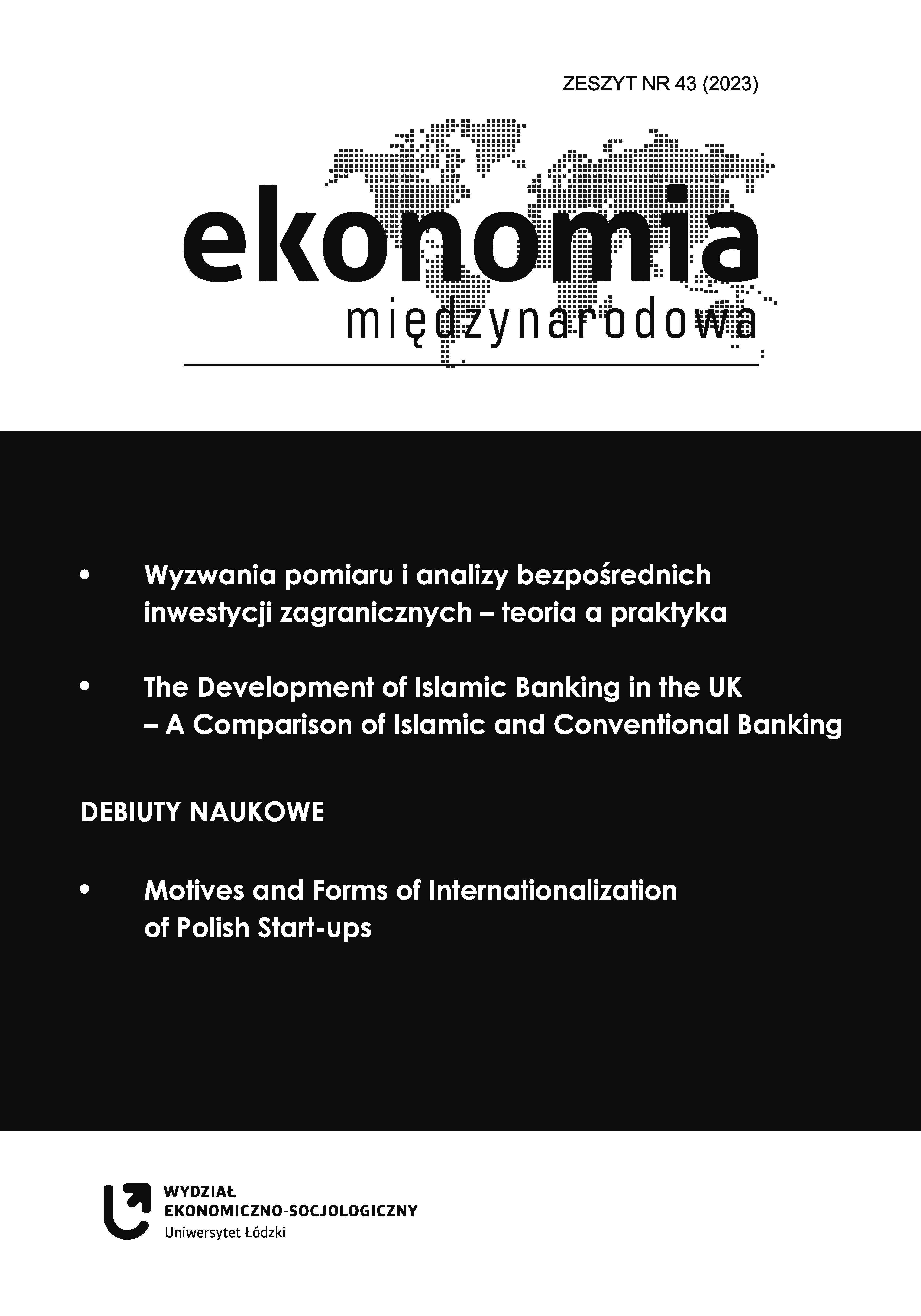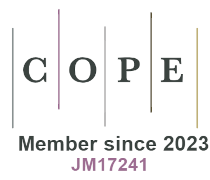Rozwój bankowości islamskiej w Wielkiej Brytanii – porównanie bankowości islamskiej i konwencjonalnej
DOI:
https://doi.org/10.18778/2082-4440.43.02Słowa kluczowe:
bankowość, bankowość islamska, szariatAbstrakt
Celem artykułu jest porównanie rozwoju kilku banków islamskich oraz konwencjonalnych działających na terenie Wielkiej Brytanii w latach 2014–2021. Zastosowano prostą w interpretacji statystyczną metodę porządkowania liniowego obiektów charakteryzowanych kilkoma zmiennymi. Zasadnicza trudność polegała na uwzględnieniu zmiennego w czasie notowania wartości rozważanych zmiennych. Zaproponowano nowatorską metodę pozwalającą na uwzględnie- nie zarówno wartości kilku zmiennych jak i ich zmienności w czasie. W metodzie tej można położyć nacisk na efekt końcowy, to znaczy rozważać tylko wartości zmiennych na początku i na końcu badanego okresu, ale można uwzględnić płynność systematyczny rozwoju banku przez położenie nacisku na wzrost wartości zmiennych-stymulant z roku na rok. W otrzymanym porządkowaniu banki islamskie rozwijały się dynamiczniej od konwencjonalnych we wszystkich rozważanych konfiguracjach zmiennych.
Bibliografia
Adamek, A. (2021). Finanse muzułmańskie na brytyjskim rynku finansowym (wybrane zagadnienia). Wydawnictwo Uniwersytetu Ekonomicznego we Wrocławiu, Wrocław. ISBN: 978-83-7695-873-6.
Google Scholar
Ahmad, S., Rahman, R.A. (2012). The efficiency of Islamic and conventional commercial banks in Malaysia. “International Journal of Islamic and Middle Eastern Finance and Management”, 5(3). https://doi.org/10.1108/17538391211255223
Google Scholar
DOI: https://doi.org/10.1108/17538391211255223
Ahmad, W., Luo, R.H. (2010). Comparison of banking efficiency in Europe: Islamic versus conventional banks. In S.J. Kim & M.D. McKenzie (Eds.), International Banking in the New Era: Post-Crisis Challenges and Opportunities. “International Finance Review”, 11, Emerald Group Publishing Limited, Bingley. https://doi.org/10.1108/S1569-3767(2010)0000011016
Google Scholar
DOI: https://doi.org/10.1108/S1569-3767(2010)0000011016
Antoniazzi, S. (2022). Islamic Banks and the European Banking Union: An overview of Critical Issues and Perspectives. “European Journal of Islamic Finance”, 9(1).
Google Scholar
DOI: https://doi.org/10.2139/ssrn.4155340
Asif, S. (2018). The Halal and Haram Aspect of Cryptocurrencies in Islam. “Journal of Islamic Banking & Finance”, 35(2). https://doi.org/10.13140/RG.2.2.29593.52326.
Google Scholar
Chowdhury, M.A.M., Haron, R. (2021). The Efficiency of Islamic Banks in the Southeast Asia (SEA) Region. “Future Business Journal”, 7. https://doi.org/10.1186/s43093-021-00062-z
Google Scholar
DOI: https://doi.org/10.1186/s43093-021-00062-z
Hellwig, Z. (1968). Zastosowanie metody taksonomicznej do typologicznego podziału krajów ze względu na poziom ich rozwoju oraz zasoby i strukturę wykwalifikowanych kadr. “Przegląd Statystyczny”, 4.
Google Scholar
ICD – Refinitiv (2020). Islamic Finance Development Report 2020. Progressing Through Adversity. ICD-Refinitiv IFDI Report 20201607502893_2100.pdf (icd-ps.org).
Google Scholar
Islahi, A.A. (2018). History of Islamic Banking and Finance. Intellectual Discourse, 26(2), IIUM Press. ISSN: 0128-4878.
Google Scholar
Ismail, F., Shabri Abd. Majid, M., Ab. Rahim, R. (2013). Efficiency of Islamic and conventional banks in Malaysia. “Journal of Financial Reporting and Accounting”. https://doi.org/10.1108/JFRA-03-2013-0011
Google Scholar
DOI: https://doi.org/10.1108/JFRA-03-2013-0011
Kasiak, M. (2016). Bankowość muzułmańska – podłoże ideologiczne oraz religijne. "Czasopismo Naukowe ACTA ERASMIANA XI". ISBN: 978-83-65158-05-5.
Google Scholar
Khan, I., Khan, M., Tahir, M. (2017). Performance comparison of Islamic and conventional banks: empirical evidence from Pakistan. "International Journal of Islamic and Middle Eastern Finance and Management", 10(3). https://doi.org/10.1108/IMEFM-05-2016-0077
Google Scholar
DOI: https://doi.org/10.1108/IMEFM-05-2016-0077
Kukuła, K., Luty, L. (2015). Propozycja procedury wspomagającej wybór metody porządkowania liniowego. Metody ilościowe w badaniach ekonomicznych, "Przegląd Statystyczny", XVI.
Google Scholar
Kurochkina, I., Us, U. (2019). The development and special aspects of Islamic Finance in Europe at the present stage. SHS Web of Conferences 67. https://www.shs-conferences.org/articles/shsconf/pdf/2019/08/shsconf_NTI-UkrSURT2019_06033.pdf
Google Scholar
DOI: https://doi.org/10.1051/shsconf/20196706033
Majeed, M.T., Zanib, A. (2016). Efficiency analysis of Islamic banks in Pakistan. "Humanomics", 32(1). https://doi.org/10.1108/H-07-2015-0054
Google Scholar
DOI: https://doi.org/10.1108/H-07-2015-0054
Milenković, I., Milenković, D. (2016). Interest and Gharar in Islamic Banking. "Bankarstvo", 45. https://doi.org/10.5937/bankarstvo1601054M
Google Scholar
DOI: https://doi.org/10.5937/bankarstvo1601054M
Musa, H., Natorin, V., Musova, Z., Durana, P. (2020). Comparison of the efficiency measurement of the conventional and Islamic banks. "Oeconomia Copernicana", 11(1). https://doi.org/10.24136/oc.2020.002
Google Scholar
DOI: https://doi.org/10.24136/oc.2020.002
Rosman, R., Wahab, N.A., Zainol, Z. (2014). Efficiency of Islamic banks during the financial crisis: an analysis of Middle Eastern and Asian Countries. "Pacific-Basin Finance Journal". https://doi.org/10.1016/j.pacfin.2013.11.001
Google Scholar
DOI: https://doi.org/10.1016/j.pacfin.2013.11.001
Salman, A., Nawaz, H. (2013). Islamic financial system and conventional banking: A comparison. "Arab Economic and Business Journal". https://doi.org/10.1016/j.aebj.2018.09.003
Google Scholar
DOI: https://doi.org/10.1016/j.aebj.2018.09.003
Shafaq, A. (2014). Islamic Finance in Western World: Development, legal regulations and challenges faced by Islamic Finance in the United Kingdom. "Journal of Islamic Banking & Finance", 31(2).
Google Scholar
Slimen, R.B., Belhaj, F., Hadriche, M., Ghroubi, M. (2022). Banking Efficiency: A comparative study between Islamic and conventional banks in GCC Countries. "Copernican Journal of Finance & Accounting", 11(1). https://doi.org/10.12775/CJFA.2022.005
Google Scholar
DOI: https://doi.org/10.12775/CJFA.2022.005
Sobol, I. (2015). Islamic Banking in the European Union Countries. "European Integration Studies", 9. https://doi.org/10.5755/j01.eis.0.9.12806
Google Scholar
DOI: https://doi.org/10.5755/j01.eis.0.9.12806
Sobol, I. (2019). Rozwój bankowości islamskiej. Uwarunkowania, problemy, perspektywy. Wydawnictwo Uniwersytetu Gdańskiego, Gdańsk.
Google Scholar
The Islamic Corporation for the Development of the Private Sector, Refinitiv, Islamic Finance Development Reports 2022.
Google Scholar
UK Trade & Investment (2013). UK Excellence in Islamic Finance. [Online] Available at: https://assets.publishing.service.gov.uk/government/uploads/system/uploads/attachment_data/file/248791/UK_Excellence_in_Islamic_Finance_2013.pdf
Google Scholar
UK Trade & Investment, Institutional Investment & Infrastructure (2014). UK Excellence in Islamic Finance. [Online] Available at: https://assets.publishing.service.gov.uk/media/5a7d696aed915d269ba8a83d/UKTI_UK_Excellence_in_Islamic_Finance_Reprint_2014_Spread.pdf
Google Scholar
Ullah, K., Al-Karaghouli, W. (2017). Understanding Islamic Financial Services: Theory and Practice. Kogan Page. ISBN: 9780749480516, ISBN: 9780749480523.
Google Scholar
Warde, I. (2004). Global Politics, Islamic Finance and Islamic Politics Before and After 11 September 2001. In C.M. Henry & R. Wilson (Eds.), The Politics of Islamic Finance, Edinburgh University Press Ltd. https://doi.org/10.3366/edinburgh/9780748618361.003.0002
Google Scholar
DOI: https://doi.org/10.3366/edinburgh/9780748618361.003.0002
Z/Yen Group, Yeandle, M., Mainelli, M. (2016). The Global Financial Centres Index 20, London, Long Finance. [Online] Available at: https://ssrn.com/abstract=3671509
Google Scholar
Abu Dhabi Islamic Bank. Retrieved from: https://www.adib.co.uk/en/Pages/Advisory-Services.aspx
Google Scholar
Al Rayan Bank - Ethical Banking. Retrieved from: https://www.alrayanbank.co.uk/ethical-banking
Google Scholar
Al Rayan Bank - Savings. Retrieved from: https://www.alrayanbank.co.uk/savings
Google Scholar
Al Rayan Bank - About Us. Retrieved from: https://www.alrayanbank.co.uk/useful-info-tools/about-us
Google Scholar
Al Rayan Bank - Values and Heritage. Retrieved from: https://www.alrayanbank.co.uk/values-and-heritage
Google Scholar
Bank of London and the Middle East. Retrieved from: https://www.blme.com
Google Scholar
Cynergy Bank - Personal Banking. Retrieved from: https://www.cynergybank.co.uk/personal/
Google Scholar
Gatehouse Bank. Retrieved from: https://www.gatehousebank.com
Google Scholar
Islamic Financial Services Board. Retrieved from: https://ifsb.org
Google Scholar
Metro Bank. Retrieved from: https://www.metrobankonline.co.uk/
Google Scholar
Qatar Islamic Bank UK. Retrieved from: https://www.qib-uk.com
Google Scholar
Santander UK Plc. Retrieved from: http://www.santander.co.uk/
Google Scholar
Statista - Top Financial Centers on the Global Financial Centres Index. Retrieved from: https://www.statista.com/statistics/270228/top-financial-centers-on-the-global-financial-centres-index/
Google Scholar
The Co-operative Bank Plc. Retrieved from: https://www.co-operativebank.co.uk/about-us/
Google Scholar
The Royal Bank of Scotland. Retrieved from: http://www.rbs.co.uk/
Google Scholar
TSB Bank Plc. Retrieved from: https://www.tsb.co.uk/personal/
Google Scholar
Pobrania
Opublikowane
Wersje
- 2024-06-19 - (2)
- 2023-09-30 - (1)
Jak cytować
Numer
Dział
Licencja

Utwór dostępny jest na licencji Creative Commons Uznanie autorstwa – Użycie niekomercyjne – Bez utworów zależnych 4.0 Międzynarodowe.









